


Faced with a large pad and with Biro in hand, at long last I attempt to recall my past years, as requested by you, Colin dear. In so doing I have mentally relived those years.
I know very little of the life of my mother, Emily Rayment, except that her father was a teacher and she herself a pupil, then teacher at Beddington, Surrey, a small church school. She was married at 18, and had 8 children of which I was 5th.I was born on May 18th 1908, at Mitcham, Surrey, in a white house over-looking the Green. At the age of three weeks I was taken to a thatched roof cottage at Burgate Cross, a hamlet near Fordingbridge, Hants. My great grandmother had "Yew Tree Cottage" built for her on the main road to Salisbury. The huge tree from which it had its name is, I am told, mentioned in the Domesday Book, but I never saw it. My grandfather died early and my grandmother brought up my father George Rayment and his sister, Eliza, from an early age. My grandmother died in February 1908, and was interred in the family vault with her husband at Ilford Cemetery in Essex. I am told that it is near the grave of Karl Marx. My sisters, Kathleen and Phyllis have visited the vault, but I have not. She left several annuities and a sum of money to be paid to each offspring of my father and of his sister at the age of 21 years. My father's sister was Mrs Eliza Leddy and lived at Weymouth. He had several daughters, but I never met them. Brother Sidney met them once. My grandmother owned a considerable area of watercress beds on the opposite side of the road from the house. There was a fresh spring well from which we fetched water, for use when bunching the watercress for markets at Salisbury and Bournemouth. Beyond the beds was the river Avon, more meadows and fields and, in the far distance, the outskirts of the New Forest. One of my earliest recollections is that from our bedroom we could look across at night and see the light from the fires of gypsies. By day they would try to sell their ware to local inhabitants. My mother always found some food - cakes or bread, so that they did not leave empty handed!
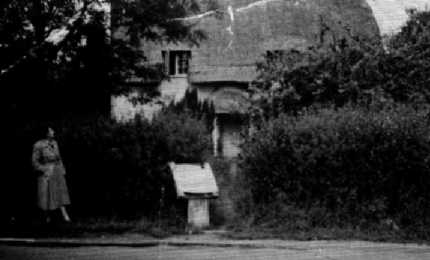
Yew Tree Cottage with Ray in 1951
Yew Tree Cottage had only cess-pool sanitation. The toilet was outside across the yard, and if dark we had to take a lighted candle! Oil was used for cooking and it was lit by paraffin oil. There was a big kitchen range, and in other rooms, coal and wood fires. There were two dogs, chickens, bantams, and ducks and at Christmas my mother would fatten up turkey. I remember how I loved the smell of some special food they had. We had two horses, one for pulling the cart, and one for the light "trap" carriage. At the rear, there was a big yard with sheds for the carts. There were brick-built stables, with stairs up to a loft where apples and other produce was stored. There were other sheds to do with the watercress business. My father would drive into Salisbury on market day with one of the family and I always remember the smell of horses, mingled with the lovely aroma form a nearby baker's shop.
I was about 4 when I started school. It was a walk of at least 3/4 mile away to the next village called Breamore. Sometimes I had a lift in a milk cart going into Breamore Station, where there was a single line railway to Salisbury. The station master had several daughters, and all had names of flowers, except one who was called "Holly". I thought it a beautiful name. I loved it at school. There were just two sections, for younger and older pupils. I mostly remember the harmonium, and the dust that arose when the pedals were used, and the end of term entertainments. We had our drill to music, with smooth wooden objects, with a brass bell at each end clutched firmly in our small hands. Every year as Christmas approached, we all took part in a concert. This was my introduction to the Boards! I remember vividly a sketch called "Dolly's Doctor". The Head Master, a Mr Blunden, had a son my age, Arthur. The stage set was a table on which was a cloth, a plate with a slice of cake, some of which had been eaten. He had come to see my dolly, and thought the cake on the table was the cause of its trouble so tasted it and continued until it was all gone. Everyone but me was laughing. Another show included about seven or so older girls in nightdresses and holding candles, with me in the centre doing likewise, they all went off stage in two's - one at each end - blowing out their candles as they went leaving me on my own with candle still alight. I cannot remember my words, but I do remember a song - and could sing it now:
The school bell is ringing so loudly ding-dong
I heard it I know as I sauntered along,
But the road is so crooked, I couldn't walk straight
I shall be in a fix for I'm sure to be late.
I had met a big boy and he bothered me so.
He laid hands on my arm and he wouldn't let go.
So I boxed both his ears and he looked such a fool
And said, "you are the very worst girl in the school!"

My parents, George and Emily Rayment:
My father was rarely spoken of in terms of
affection but, since I have reached old age, I find lots that were good. One
example was when I was about 3 to 4 years old. Grace had a birthday party, on
August 9th. I had been dressed in a clean pinafore. There had been rain and
lots of apples had fallen off the trees and I collected them in my pinny - for
which I received a smacking and cried. My father picked me up and said,
"You are too young to know any better," and comforted me. He played
the accordion well and loved me to play, in later years, the Sankey and Moody
hymns from the Salvation Army book such as "Let the blessed sunshine
in!" He was very well liked all through his life despite the upset he
caused through drinking. Great-grandmother had left him an annuity which was
paid to him twice a year, at the end of June and at Christmas. Hence our
Christmases were always disrupted. He would treat all his pals as well as
himself. It was not all his fault, I feel now. When he was a young man, ale was
the staple drink, I am told. Also I am sure there were difficulties unrelated
to drink. They had 8 children, I was the 5th but we were never a close family.
Grace and I always got on well, Sidney and Ted were great pals.

Sister Eva
I clearly remember when a new piano arrived at our house, covered with a Hessian trimmed with red braiding. Sister Grace started having lessons from a Miss Bland in Fordingbridge. My father always encouraged any musical interest, and we all, at appropriate ages, received lessons. The three boys sang in church choirs. Grace tried to learn the violin which Elizabeth now plays so well. Kath and I had a period when we sang duets which I played for, and earned 2 guineas each at Masonic dinners. My second sister Eva, met and was married to an excellent baritone who was in Beddington Church choir when I was about 13 or 14, and I accompanied him in songs that later George sang. Eva sadly died from peritonitis. She was expecting a baby. Frank joined the army as soon as he left school, travelled abroad, and when he was 21 emigrated to Australia having received his legacy from GG. Sidney and Teddy, divided by two and a half years, did everything together. When each had a motor-bike, they met two girls, sisters, and the sisters each married a brother. Sid joined a paint making firm, after leaving the army (1914-18) and did very well, and was quite an artist in his way. He and Dorrie, his wife, often came to see us in later years. They had, still have for Dorrie, a caravan at Corton, on the east coast. For several years Dorrie's brother has driven her down to see us and I'm very fond of her. Teddy became an electrician with his own business.

Brother Sydney on his motorbike
Which leaves sister Kath. Mother used to say that "Kitty", as she was called, was such a good baby but that I was anything but! She was probably right. I like to think that I worked off my tantrums at an early age, making me less aggressive in later years. Kath was very good at school, particularly so with figures. She eventually got a job as cashier at Sainsbury's Sutton, Surrey. We were living at Carshalton them. Later she went to other branched auditing. During one such audit she met, and fell in love with a manager, no less, but nothing came of it. From my early teens I was always told to "take Kitty with you."
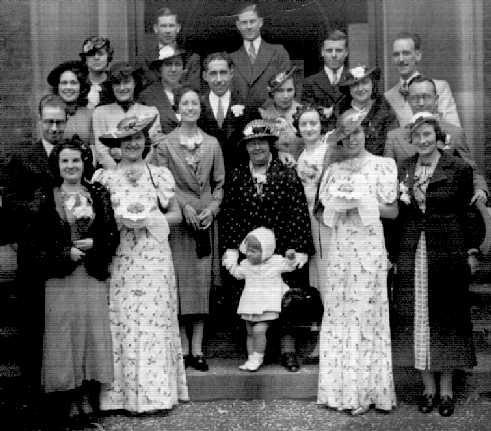
Brother Teds wedding:
At the outbreak of war in 1914, I remember swinging on our big iron gate and watching soldiers marching along towards Salisbury. I also remember being at a funeral of a soldier in Fordingbridge and the firing of guns as a salute. But I remember very little else until it was decided that we were to return to London. When I arrived at Mitcham Junction, surrounded by open common land and fields I was sorely disappointed at first. We stayed at Beddington with my mother's step sister Aunt Jinny. The surname was Leach. I cannot remember the house, but they kept a dog on a chain at the rear entrance.

The Rev A.D.Young, priest in charge at St Andrews, Carshalton in 1922
We were only there for a short time before moving to a wooden semi-detached house in Green Wrythe Lane, Carshalton. We went to school at Hackbridge but later transferred to Camden road School at Carshalton. I was picked out for singing and drawing, but really wanted to be good at netball! My teacher was Miss Carr, the Head Mrs Legg. I remember Empire Day Country dancing in Carshalton Park. My mother would not let me sit for a scholarship to Wallington Grammar School, and I left school at 14 years. My schooldays were happy. I suppose I had average ability but often had to sing on my own and my drawings were often pinned up. We also had trips to Crystal palace, and every year to Mitcham Fair.
From the time we moved to Carshalton, probably about 1918, we young ones went to a small church St Andrews. There were various activities there in which I took part. "The Band of Hope" (anti-strong drink), a knitting class whose output went to the "heathens in far-off countries", and each year we had a Christmas show. I usually had a part. A concert was arranged for an adult society and I was asked to sing soprano in a 4-part harmony arrangement of Negro songs which I thoroughly enjoyed. About the age of 14, I started to play tennis with church friends, and also to look for a job.
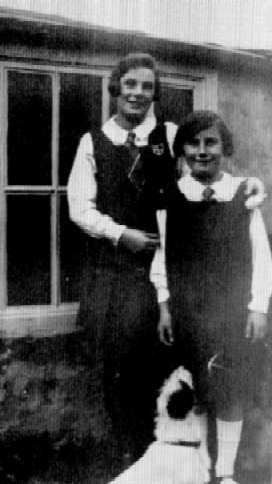
Ray (left) and Phyllis about 1923
Jobs were difficult to get, but Kath was working in a box factory and through her I was taken on. Staff cuts and "last in, first out," meant that I was only there a few months. I found myself a job in at a "silk" factory - they printed designs on various articles like tablecloths, with a mixture of colours. The river Wandle ran alongside and I found it not unpleasant. I helped with the packing. A forewoman took an interest in me and whilst out walking one day, I saw here in the garden and she said I was in the wrong job. I had brains and should use them and suggested the Post Office or Civil Service. She sent for particulars and gave them to my mother who took me to London for an exam, a medical and an interview. The outcome was that I became a Girl Probationer in the Civil Service and was sent to the Hop Telephone Exchange near London Bridge.
I remember getting up in the early hours to walk to Hackbridge were we caught the "workman's" train to London laden with an unlimited supply of food for ourselves and the animals at the zoo.
There were two new girls, Kathleen Cross and me. At the exchange I often had to go behind the switchboard to deliver forms etc to the engineers, and one, named Arthur Preston was particularly friendly. He was very much in love with a girl who lived at Beer in Devon. Remember he was, to me, quite old, and I just a schoolgirl. We talked music and I was invited to his home at Rayner's Pak near Wimbledon. They were a lovely family, Ernest his brother, and his parents. We played duets and had singing sessions and I was treated as one of the family, of a loving family such as I had never known. Shakespeare, in Hamlet, speaks of the "Divinity that shapes our ends" and this period played a part. Miss Legg was the Principal at the Exchange and she helped me when I was working for exams. For two afternoons each week we went to the "Post Office Day Continuation School" at London Wall, and I loved it. We had the letters on our hatbands in red. The history master was Loman Loads. I passed my exams well up and was later given a prize, "David Copperfield" at County Hall. I was taught, believe it or not, by a Miss Victoria Rayment, no relation though. She was a dear lovely person and took me out and about. An exam at the end of a year placed me up near the top and I was posted to the Money Order Department at Holloway - a long journey from Carshalton. I was advised to put in for a transfer to the City, which I did the first day there.
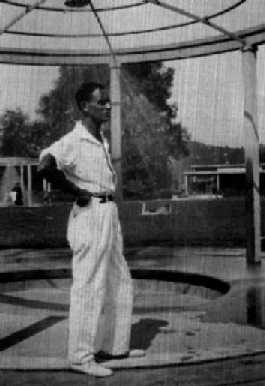
Roby, the lifeguard in Switzerland July 1931
On December 2nd 1925, I started work at the Money Order Department, at Manor Gardens Holloway. My first meeting with Bunty was on my first day when we sat in a huge waiting room looking at each other, and have been friends ever since. Winnie Amas (Foster) came with me. Our supervisor was a Miss Boote and we did tease her, but I'm sure she was fond of us. Whilst there, Winnie, Marjorie Bennett and I had a holiday in Switzerland, on Lake Lucerne. Winnie and I went to a dance on a small island, with tiled surface for dancing and met a chap call Robert, who was an official to do with exercising, and was always around where we bathed. It was a wonderful holiday, quite near the cathedral. Our room, on the first floor, had a balcony over-looking the lake and wisteria growing in the open French windows with lovely scent, which permeated our rooms. On Corpus Christ there was a procession of clergy and small girls in white and an alter at the top of the cathedral step where a service was held. My first trip up a mountain was unforgettable. The views from Pilatus held me spell-bound. I corresponded with Robert for quite a while. He had a sister married to an Englishman, who lived in Sevenoaks! He wanted me to spend another holiday in Lucerne, and said his sister would accompany me as a chaperon.

Ray's concert party in 1930
Around this time I had become friendly with some other teenagers from Wallington. I sometimes went to Wallington parish Church and one Arthur Gilbert, a draughtsman, also a Civil Servant attached himself to me. He was a Rover scout, attached to the church and asked me to accompany a concert they were doing, which I did. He had a friend, Desmond Pride, to whom I was introduced, as he was very musical. With the intention of finding out what I'd like as a birthday present. Arthur did a series of "pin" people - our group -, which I still have in my Tangiers purse bag. He also painted the lychgate of Beddinton Church, where sister Grace was married to Graham Boyd, a rubber plantation manager form Jahore, and gave it to her as a wedding present. To return to the Wallington crowd, after a couple of concerts I was asked to sing solos and eventually Des took over the accompanying and sister Kath and myself with songs and duets and a soubrette, a rather fat and very versatile third lady. After a few cocerts, Duffy Des's mother took over and his father Sid Pride produced. He also made up most of our material - sketches, monologues etc. He was a Fleet Street illustrator of magazines etc. he did a sketch of a "Black-bird singing", and also one of me in my autograph album.

Bob, Des, Ray, Jack and Madge at Selsey in 1930
By the time Arthur G had bought my much-used Beethoven sonatas and had accepted that Des had I were good friends. We must all have such happy memories of those days. Rehersals at the Prides, parties in plenty - particualrly New Year's Eve as Des's birthday is on January 1st. Duffy was a brilliant pianist and a smoker. She was wonderful company at all times. Sid played a one-string fiddle and he had a brother, who was often in the party who played banjo. So there was always lots of singing and lots of laughter. Another frequent visitor was a young man, older that most of us, who sat on the piano stool and play all sorts of types of music by ear. Happy days! Well some of them were not entirely happy. Des became extremely jealous if I laughed around with the others. We spend a lot of time quarrelling and making it up. At that period in my life I was travelling up to London daily, we always sent up on the same train, during which time he tried to teach me theory by setting me questions as homework. He was very interested, and knowledgeable, in Egyptology, so I had a course in that. Most favoured my me was his knowledge of Dickens's London. He had an uncle, his mother's sister's husband called Pentlow, who was a authority on Dickens and had taken Des around to various places, to which he later took me. We also went to concerts in London.. The Prides had a bungalow at Selsey Bill and I joined them on two holidays, then one year Des and I went and stayed a week at a Bed and Breakfast. The owner made certain that we did not go into each other's rooms at any time under her roof! We were always hungry and our meagre funds were spent on Lyons cakes etc., but it was such a happy break for us both. In due course I became disenchanted and so often we disagreed, resulting in brief separations, then he would compose something and send it to me and back again together until the next time. He sent me more compositions and we went together to hear the Royal Choral Society sing Messiah at the Albert Hall where we had a box! In the end I realised I could not live with him peacefully, and as I had known a childhood overshadowed with parental rows, I went my own way.
I arranged to go to Switzerland, booked up a Mediterranean cruise for the following year, took part in concerts given by our ballet class, and went to a dance to do with the office in London, and the MC was Mr George Windsor! After a dance he would stay talking to me and I had to remind him of his MC duties. It so happened that he had tennis elbow and so had Saturdays free, during which we walked miles or took a train to the coast. We had to work Saturday morning then. He saw me off on my cruise on the Moldavia and that is another story. Des also decided to learn German and at his class, as I later learnt, he met and was married to another student a year after I became married. So ends the tale.
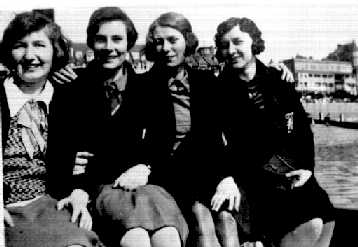
Winnie, Ray, Amy and Marjorie in July 1928
Vera Smith and I had to share a cabin with two other girls, another Vera - so she became Veronica, and Grace Pickard from Derbyshire. Grace and I sparked off each other, and the other two got on together. The first evening I danced with Charles - he earlier insisted I must straight away post a card to my parents as it would be collected before we sailed - which I did, and also one to George. During the cruise we were mostly with one group during the day, and another in the evening. Our first stop was at Tangiers and as I stepped on the quay side I called out "I'm actually in Africa!" There was light grey uniformed police officer who was amused by this, and he came to say a few words, ending up by saying "Look for me when you return". Eight of us went off on donkeys each with a native guide. It was hilarious. At any ascent or descent the donkeys would all bray and make a shocking row. I cant remember much more of that day except that on our return to the quay my police officer friend was waiting with a lovely Moorish bowl, a photograph of himself and his address. The bowl I later had hanging up in the hall at No. 6 Hayes Chase. After some years there, we found it one day in pieces on the floor. Back on the boat we did Keep Fit exercises every morning, and games. I was a finalist in the Deck Tennis competition. Our next port of call was Barcelona, a lovely city, flowers everywhere. We had a trip up Mount Tibidabo. At the top an ornate large church. Our next stop was at Algiers, and again we saw the native quarters and shopping areas, but unforgettable was when driven up high about the town at dusk and out to sea. Our last stop was at Gibraltar, where we went shopping in the narrow very busy shopping street and I bought orange and black silk pyjamas which I never wore! Most of tour time was spent on the beach, swimming and sun bating. W did a lot of swimming on board, We also took part in a concert - Vera and I sang duets. An another occasion Grace and I collected for the "unseen" crew and later had drinks with the Purser. It was a wonderful holiday. We had arrived back in London mid-day, I think, because, we four girls and the day guys went along to a variety theatre in the afternoon and most of them went to sleep! Later Vera and I met Charles and another chap and we were taken to a Night Club, which I found very dull. I have to remind readers that this was in the 1930's where there was every respect given to women. I don't remember kissing any of the chaps or anyone trying to kiss me. Very different from today, so far as I understand today's standards.

Ray with friends on her cruise
I had put in for a transfer on my very first day at the Money Order Department and after 1 and a half years there a move came. I was sent to Accountant General's Department's head office in the City, on my birthday in 1927. Three weeks later I was joined by Winnie Amas. I also became friends with Marjorie Bennett who lived at Catford. A group of 8 of us put 1 shilling aside for a club and took it in turn to choose a theatre where we would go once a month. Another was the music club, which I ran. We each brought a piece of music, which was passed round to the members and was eventually kept by you. There was also a holiday club collection. My first holiday was with Marjorie Bennet and we went to Shanklin Old village. We enjoyed our first week but by sister Eva, who was very ill and being looked after at home, had died and I had to return. She had married a Civil Servant at Somerset House who was a very good singer and was in the choir at Beddington Church. I often played for him to sing at home.

Ray and George with friends from the office
Having returned to the daily round once again,
George and I continued to meet at weekends and sometimes during the week. Being
and organist and choirmaster he was busy Tuesday, Fridays and Sundays as well
as weddings and funerals. The Royal Choral Society was another commitment. I
went to a performance of Hiawatha in which George took part. The whole arena
was used and it was a most colourful presentation, both to see and to hear. I
was soon roped in after having an audition. At that time Malcolm Sargent was
ill and we had a series of conductors, including Beecham, Vaughan Williams, and
Dame Ethel Smyth to name a few. Another occasion was a party given to members,
with dancing etc and Malcolm walked around speaking a few spicy words. In
rehearsal I sat in the third row, so could hear all the tit-bits he said -
never at a loss for the right word. It was after a recital of Elijah that
George and I walked through Kensington Gardens and we stood on the bridge,
still affected by the great volume of sound we had been part of, when he asked
me to marry him! We found a secluded, dimly lit tea place and we had soft roes
on toast! Then we went off to what was then, the Old Vic, and saw Cav. and Pag.
- another feast of musical sound. George was already 31, so there was no point
in a long engagement. We fixed the date for July 1st 1933. Sisters Kath and
Phyllis and friend Vera Smith were bridesmaids and a friend who lived near him,
Reg. Bridle was best man. It was a lovely wedding held at St Mary's Church
Shortlands where George was organist, so there was a full choir and a large
congregation. His leading soloist was sang "Where're you walk" by
Handel at the signing of the register. A reception was held at the Church Hall,
Before I left for the Church (I had to change at Cedars Road, and George at
Reg. Bridle's house) I sat at the piano and played and sang "Today I am so
happy!" A very dear friend of ours, Ken Bell played the organ. He later
drove us back to our new house, Trebarwith, 6, Hayes Chase where our car was
already packed so were quit unprepared for the showers of confetti when we
opened them at Alresford, Hants, our first stop. We were up betimes and went to
Holy Communion before breakfast, then on the Newquay, Cornwall where we stayed
at the Trebarwith Hotel right on the front, with private steps down to the sea.
It was a very happy time for us, lots of swimming and walking and party group
outings.

Ray on the cliffs outside Trebarwith
Back to our own home again - new house, new furnishing, new husband and wife. Such a lot to learn and experience. At times I felt very lonely with George away all day and I started looking at job advertisements. But in those days, 1933, it was not "done". We both joined the Cedars Tennis Club (George 's old club at Beckenham) and of course George had two choir practices, plus choir every Monday evening. Our 2nd year, we holidayed at Capel Curig, North Wales - a lovely spot. Walks and climbs were organised, George going on the climbs and I on the walks. There was a tennis court which we used, and a wide part of the river where we occasionally swam.Delia was born on May 19th 1935 at Oakham nursing home. Our doctor thought I should have three weeks there as it would save trouble at middle-age! I longed to get home. When I did arrive it was to be greeted with strings of flags from the front wall of the house to the garden wall. Also, an iced Welcome Home cake George had ordered. So began years of learning by experience. Before marriage I had taken a short cookery course at a state evening school near the Elephant and Castle in London and emerged with a certificate which I framed for the kitchen a as reminder. In due course I acquired a charlady. I could not have found better person and she was with me twice a week for years.
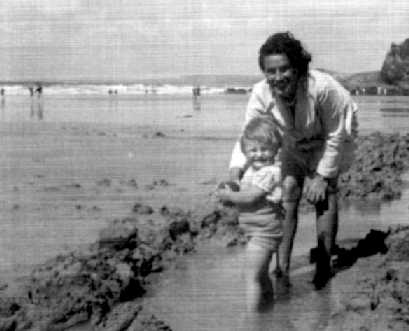
Ray with baby Delia in 1937
I remember being in our dining room at Hayes Chase, West Wickham listening to the wireless, and hearing Chamber lain re-affirm the British pledge to Poland, in July 1939. We were all issued with gas masks and told to wear them at all time except when sleeping! There was a rush to buy extra sugar and butter. Most school children were evacuated but we had had a deep shelter built in our garden at rear, within natural woodland. It had also been arranged that I should take Delia and Colin down to stay with my sister Grace and brother in law Graham at Worthing. They would have been forced to have taken in evacuees in any case. They had no young family of their own and were not at all happy to have a couple of very young ones to disrupt the even tenor of their days. Driving down with no sign posts and very apprehensive, we were there when war was actually declared. However in the Worthing area nothing much was happening.
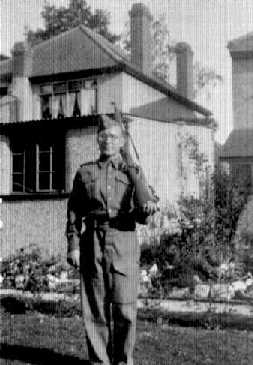
George all ready for the home guard
George had had to return to work, and we all wanted to go back to our own home, and did not regret it. We spent nights in the dugout, sometimes shared by Dorothy Senior, and her dog next door. We would hear aeroplanes and know if they were "ours" or "theirs".
Colin was born on 28th June 1938. I had thought I would never love as I had loved Delia, but of course, I soon found I could. Over the early years we had great fun together. With George out so much I read them stories and played nursery rhymes etc. As they became old enough to cycle we would on occasions like Good Friday when George had the Messiah at the Albert Hall and left home by 12 noon, we would go out to the White Bear area and picnic. When the war started in 1939 Colin was only 1 year old, George joined the Home Guard. We had a shelter build in the garden and when the air raids were bad, we slept there. Every day I had to take all the bedding indoors as it would get damp if left. We did have electricity laid on for light and heat. There were Canadians at a comp nearby and they filled some sand-bags at the entrance.

Ray with Colin aged 10 months
We were having very noisy nights when Colin developed scarlet fever. I did not want him sent away to hospital so a friend of my father-in-law said she would look after Delia. I hung a damp sheet over Colin's bedroom door, changed every time I went into him. One night with a stick of incendiary bombs had fallen, Colin said "You go down into the dug-out Mummy, I'll be all right!" I had one neighbour who came in daily and insisted on me going out for a walk. Her name was Mrs Friend who was indeed a friend. She lived further down Hayes Chase and was a tower of strength. We both changed every time we entered the room. Delia was about 5 1/2. I cycled to see her every evening, about 3 miles each way. I used to sing "I'm going to see you today", a song by Joyce Grenfell, popular at the time. I wrote frequently - I still have some of here letters. At least she did not catch the complaint.
George was by then in the Ministry of Supply, Deputy Director of medical Supplies, and when Colin was one and a half years old was transferred to Leeds. He found us a 4-bedroom house to let 27, Gledhow Wood Avenue, near Roundhay Park. He found for himself lodgings until I and the children, plus Joan, our very young maid, plus Fluff, our cat, arrived. I had to see to all the removal, taking up stair carpet, curtains etc. A large bomb had exploded fairly near, so, some people across the road saw to the repairs and rented Trebarwith, agreeing to get out when we were able to return. Thankfully that did all work out well. The day we left we could not find Fluff, but he arrive in a laundry basket several days later, very sooty, having hidden up the chimney! We arrived at our new home about 4 pm and dusk. It was January and several inches of snow. The furniture van was already there and the men digging a pathway to the door.
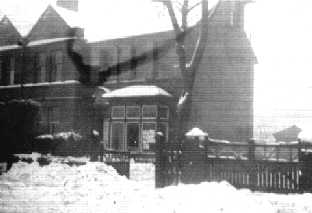
29, Gledhow Wood Avenue on our arrival in January 1941
Our marvellous neighbours, Mrs Burr took us into her warm house, where pile of bedding were airing before a big kitchen range. The men could only take in the beds and a few essentials. It was war-time and no lights were to be shown outside. Mr and Mrs Burr gave our workmen a bed and meals for the night. George had to go to work next day so after the men had unloaded and deposited, Joan Pocock, our little 17 year old maid, and I got things reasonably straight. It was a 4 bedroom house, with a staircase to an upper floor with a very large room, The kitchen had a stove fired by coal. My neighbours all made their own bread and before long I did the same. It was a large kitchen. In fact all the rooms were. Outside was a separate wash room, with boiler and there were other out-places. Not a very big garden, but enough to grow some vegetables. Mrs Burr turned out to be a really wonderful friend. Her daughter, about 17, and still at school and Joan palled up quickly. A younger brother was learning to play the violin, so I was able to help him. The area was called Roundhay and there was an extensive park with lakes and swings.

Our cat Fluff at Holland Way
So began a new life. We joined a tennis club and had a few outings in the car, but with petrol rationed we could not go far. I was in Leeds shopping one day when I was asked to become a blood donor, which I did as asked, there and then. Hence I was late back with the dinner, liver and bacon still in my bag. Before long the powers that be were sending George back to London for short stays at first, then longer spells. Eventually he had to return for good so we all did, and were fortunate to get the people renting Trebarwith to move just across Pickhurst lane. There had been a bomb dropped fairly near so we had to have that repaired with was essential -not a lot thanks be. By then the war in the air was on. There was much more activity as regards air-raids and George used to do night duty in Bromley after a day's work and all the difficulties of travelling. House keeping was a worry. If one heard that oranges or bananas were in a certain shop, I'd rush off on my bike and queue. Most essentials were rationed as well as clothing which was on coupons.

A party invitation for the Hayes Chase cogs
During the war I ran the road's collection of things and to help the war effort. My "gang" called "Gogs" (cogs in a wheel) worked hard and I still have the register I made. During the war Dartrey House Kindergarten where Delia stared her schooling was evacuated to Wales and only a few pupils were left, Dr Pitt-Paynes, Bruce, Malcolm Marshall, Delia and perhaps another 5 or 6 children. We all became very friendly. Gwen Marshall and I particularly and the Pitt-Paynes, as they belonged to the Park Langley Tennis Club. The Marshalls had an allotment adjacent to ours, across Pickhurst Road, where we grew our vegetables.

A Christmas card from the Seniors next door
During the war days, I took a course of violin lessons from Mrs Hay in Pickhurst lane. My eldest sister Grace, gave me her violin before we went out to Malaya and I enjoyed my lessons, even if the siren stopped us occasionally. At the end of term, we gave a concert, mostly children, but several adults.
At last the war ended and Hayes Chase had a glorious celebration. A big party in the road for all the children and later a magnificent firework display organised by my friend still today, Mac Evans, how 'phones me regularly and we talk about the days when we both live in Hayes Chase. The war years were behind us, but rationing and clothing coupons continued for some long time. It was wonderful to be able to sleep peacefully in one's own bed again.

A Park Langley Dramatics programme October 1948
In due course an association called "The Park Langley Residents" was formed- a sort of social club where members could meet, play table tennis and other games, and a group gave a concert with included a one act play. My adenoidal "Sorry to disturb you, Miss Tremaine" - the opening words - have been echoed over the years. It was a great success, and although in time, the Club as such folded up our group formed a proper company called "The Park Langley Players". My good friend was our brilliant stage manager, and his, and my dear friend, Walter Dossett was produce, again quite brilliant. By a strange coincidence Walter was an old friend of the Prides and very musical. The company still continued after we left Hayes, and still is, I understand, under a different name. They were happy days.
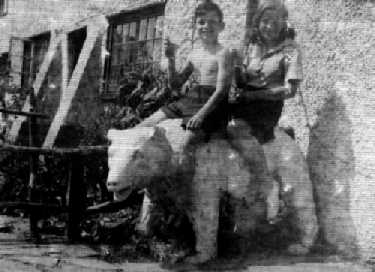
Colin and Delia at the White Bear on a cycle outing
Another side-line was accompanying a friend Mrs Barclay, a local contralto singer, for her convert practise work, and also for lessons she gave to another woman. For this I was paid. It was while I was with them that we heard of the death of Kathleen Ferrier, and we were all too sad to continue.
Here I must remember the Windsor Ensemble, George on piano, Colin on clarinet, Gordon Bartlet on trombone and Delia on the recorder. Colin worked out solo pieces for Delia as her instrument drowned her contribution. It was great fun - Gordon would choose Delia's solos to clean out his trombone for which I provided a saucer!
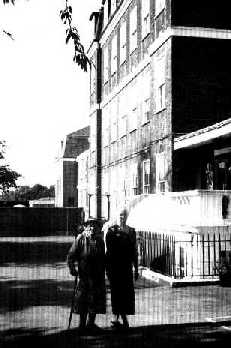
Holy Trinity Convent, Bromley in 2000
I think Delia was about 7 or 8 when we started to look for a school for her. Our choice would have been Mary Dachelor because of its musical tradition, but at another school, Haberdasher Askes, the head mistress advised some place nearer her home as a daily long journey could become too tiring, especially later on. Good advice, we thought, and eventually chose Holy Trinity Convent. We were impressed by the Rev. Mother and the building and grounds, so she stared there, Colin also for 2 years or so. The Sisters always asked after him and I often wonder what Rev. Mother would have said if she had known of his progress. Delia ended up as joint head girl with a catholic. When Colin left he went to Dulwich College Prep. School where he did extremely well. One afternoon a woman stopped me and said, "your son I always so well behaved on the train." It was at the prep he first met Roger Tolman, and I met his mother Mary, always my very dear friend.
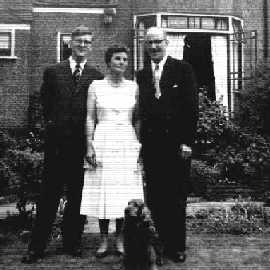
Roger, Mary and Clifford Tolman at 44, Lakeside Drive
Colin did not get into the College, but as it transpired it was a good thing. It was not so far to travel to Beckenham as Sydenham and there was a musical tradition and also an excellent science master. Colin was encouraged to sit for a Demiship at Magdalen College, Oxford, the only one going for which he was eligible and he was awarded it! The news came by post. I guessed what it was and could scarcely wait for their return. When I heard the car, I rushed to the front door and in came Colin, with George's trilby askew on his head and looking as though they had already been celebrating. We were all delighted. During the next few years we began to know more and more about Oxford and the surrounding country.
Delia left Holy Trinity and went to learn shorthand and typing. She was not very happy about this but we felt she had to be trained for a career of some sort. As things turned out she met Mike and later they were wed. Later still they had three stalwart sons - our first grandsons.

At Parklangley Tennis Club
George retired in 1961 but we remained at Holland Way until 1970, chiefly because we played a lot of tennis at first. My usual ladies four - actually we were seven but we had a rota so there was usually a stand -in if one of us could not manage the day. Eventually we had two mixed fours. Meanwhile we studied the local newspapers for a bungalow, and went to look a places in quite a large area. We decided on a new one at Hawkhurst , Kent paid a deposit, come home and I certainly had a bad night thinking we had made a mistake. Next morning we drove to agent and fortunately, he still had the cheque which he returned straight away. Relief all round! We had told Delia and Colin about it and the next we heard Delia and family had driven to Worthing and on to a place called Ferring, and had found a suitable place near shops and bus route and gave us the name of the House Agent. We wrote and asked for particulars and were sent several. George had said I would never be satisfied! Not so, but I did know what I definitely did not want! We decided to look at three. The first in a tiny close of three bungalows, dark, unused for a long time it seemed. The second had an excellent added kitchen, but the rest was very old fashioned, and the two bedrooms were very small, The third one "Charnwood" for me fitted what we needed. It was February and the owner's married daughter was stretched out on a garden "bed", the sun pouring into the excellent sun lounge, in the living room a wall for the piano and music cabinet. At first I was not keen on the kitchen facing the road, but now I am so thankful. Being on my own it is good to see other people round and about. Thus wheels were put in motion. We sold Holland Way and came to Ferring in May 1970.

Ray with Colin, Jane, Jo, Lizzy and Margaret at Ferring
We were at Ferring 3 weeks when Jonathan was born and we went up to Avebury. As a toddler he cam down occasionally to stay with us but really his heart was back at Avebury. I shall never forget the first time we saw the twins. It was through class in the intensive care room, one in the arms of a white nurse the other with a dark nurse, so tiny, so frail looking. Thinking of them now it is difficult to imagine that time had brought about such a difference. Elizabeth always brimful of energy, following Jon in every possible way. Darling Jane had so much to contend with - her eyxma a continual trial which I have always thought she bore with amazing patience.
The account as written in Ferring about 1993
Transcribed by Colin Windsor: April 2002
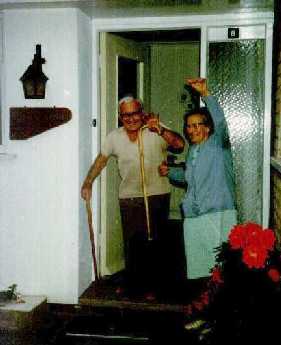
Ray and George saying goodbye at Ferring
Copyright 2004 Colin Windsor : Last updated 5/10/2004